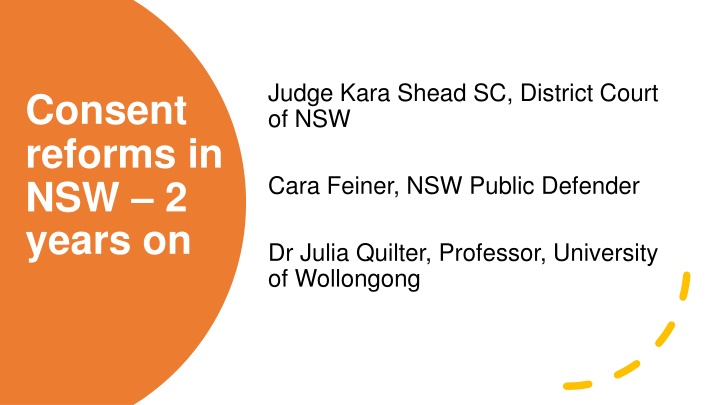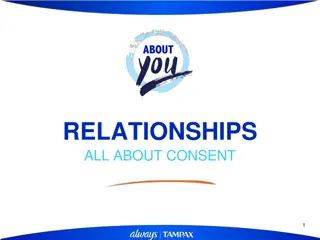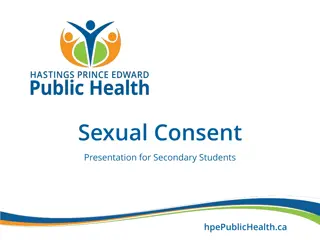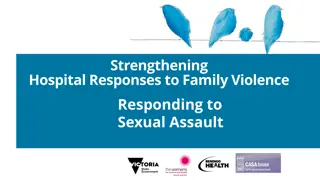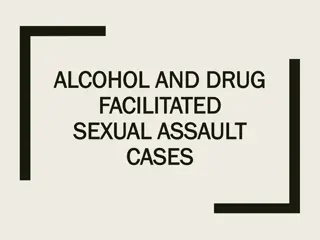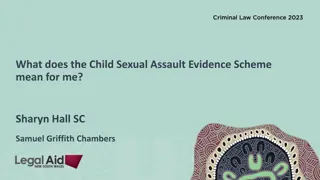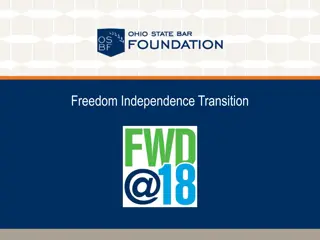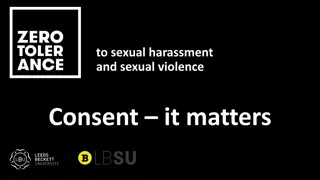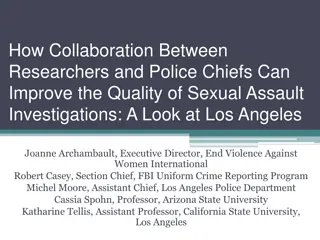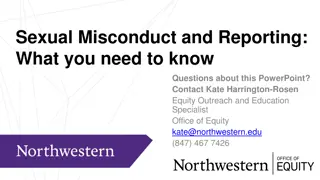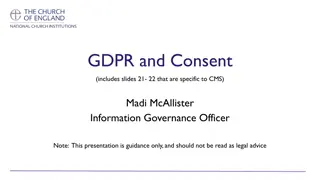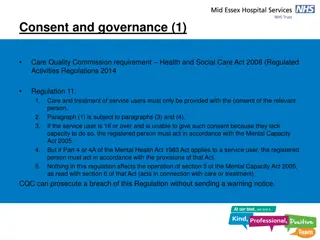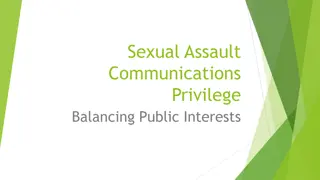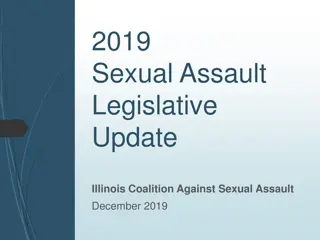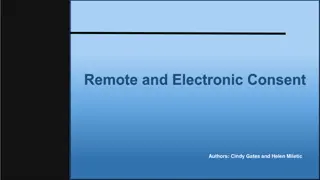NSW Consent Reforms: Legislative Changes and Impacts on Sexual Assault Laws
In the past 40+ years, the NSW legislative landscape has seen significant changes in addressing sexual assault, culminating in the recent Crimes Legislation Amendment (Sexual Consent Reforms) Act 2021. These reforms implement recommendations, introduce affirmative consent model, and enhance provisions in the Crimes Act 1900. The reforms include new jury directions and separate provisions for consent beliefs. Commencing on June 1, 2022, these reforms aim to strengthen legal protections and redefine the standards for consent in sexual offenses.
Download Presentation

Please find below an Image/Link to download the presentation.
The content on the website is provided AS IS for your information and personal use only. It may not be sold, licensed, or shared on other websites without obtaining consent from the author.If you encounter any issues during the download, it is possible that the publisher has removed the file from their server.
You are allowed to download the files provided on this website for personal or commercial use, subject to the condition that they are used lawfully. All files are the property of their respective owners.
The content on the website is provided AS IS for your information and personal use only. It may not be sold, licensed, or shared on other websites without obtaining consent from the author.
E N D
Presentation Transcript
Judge Kara Shead SC, District Court of NSW Consent reforms in NSW 2 years on Cara Feiner, NSW Public Defender Dr Julia Quilter, Professor, University of Wollongong
The content of this talk may be distressing to some of you. If you are finding it distressing, there are services available to you that may assist. In the first instance you may want to contact your Employee Assistance Program through Converge International: To book an appointment: Phone: 1300 OUR EAP (1300 687 327) Website: www.convergeinternational.com.au EAP Connect App: Once your appointment is booked, it will be confirmed within 24 hrs via a SMS reminder. You can change or cancel up to 24 hrs before your appointment without forgoing your appointment time. These services are available 24 hours, 7 days a week, to facilitate enquiries, booking requests and to provide assistance in crisis situations. Warning Other services to be aware of are: Full Stop Australia 1800 FULL STOP (1800 385 578) Lifeline 13 11 14 for 24/7 crisis support
Legislative reform 40+ years 1. 1981: Crimes (Sexual Assault) Amendment Act 1981 most significant: - graduated series of offences - expanded conduct - Gender neutrality - Move to consent 2. 1989: Crimes (Amendment) Act 1989: moved from graduated offences to three basic offences to 3 offences sexual assault; indecent assault; and acts of indecency 3. 2007: Crimes Amendment (Consent Sexual Assault Offences) Act 2007 - introduced an express definition of consent; - expanded the list of automatic negations and included may negate consent; - provisions re knowledge including no reasonable ground 4. 2021: Crimes Legislation Amendment (Sexual Consent Reforms) Act 2021
Implements ALL 44 recs of the NSWLRC Report -> BUT ALSO introduced affirmative consent model Significant changes to: substantive offence provisions -> Crimes Act 1900 Improves current structure including creating separate provisions for AR/MR new AR circumstances of no consent new MR in relation to belief in consent not reasonable Recap: Sexual Consent Reforms procedural changes -> Criminal Procedure 1986 5 new jury directions Commenced 1 June 2022 Substantive provisions all offences committed after 1 June Jury directions apply to ALL trials from 1 June
New Subdiv 1A broken into: 61HF Objectives STRUCTURE: Crimes Act 1900 Part 3, Division 10, Subdiv 1A 61HI Consent generally 61HJ Circumstances in which there is no consent 61HK Knowledge about consent Application: This Subdivision applies to offences, or attempts to commit offences, against sections 61I (sexual assault), 61J (agg SA), 61JA (agg SA in company), 61KC (sexual touching), 61KD (agg sexual touching), 61KE (sexual act) and 61KF (agg sexual act): s 61HG(1)
S 61HF Objectives An objective of this Subdivision is to recognise the following (a) every person has a right to choose whether or not to participate in a sexual activity, (b) consent to a sexual activity is not to be presumed, (c) consensual sexual activity involves ongoing and mutual communication, decision-making and free and voluntary agreement between the persons participating in the sexual activity.
61HI Consent generally (1)A person consents to a sexual activity if, at the time of the sexual activity, the person freely and voluntarily agrees to the sexual activity. (2)A person may, by words or conduct, withdraw consent to a sexual activity at any time. (3)Sexual activity that occurs after consent has been withdrawn occurs without consent. (4)A person who does not offer physical or verbal resistance to a sexual activity is not, by reason only of that fact, to be taken to consent to the sexual activity. (5)A person who consents to a particular sexual activity is not, by reason only of that fact, to be taken to consent to any other sexual activity. Example A person who consents to a sexual activity using a condom is not, by reason only of that fact, to be taken to consent to a sexual activity without using a condom. (6)A person who consents to a sexual activity with a person on one occasion is not, by reason only of that fact, to be taken to consent to a sexual activity with a) that person on another occasion, or b) another person on that or another occasion.
S 61HJ Circumstances in which there is no consent 11 circumstances of non consent Note: non-exhaustive list: see s 61HJ(2) Amalgamates the former automatic and may negate consent provisions and additional non-consent circumstances s 61HE(1)(a) is NEW Designed to cover the so-called freeze response (rec NSWLRC & Saxon Mullins)
61HJ Circumstances in which there is no consent (selected) (1) A person does not consent to a sexual activity if (a) the person does not say or do anything to communicate consent, or (b) the person does not have the capacity to consent to the sexual activity, or (c) *the person is so affected by alcohol or another drug as to be incapable of consenting to the sexual activity, or (d) the person is unconscious or asleep *no longer a may negate consent; previously substantially intoxicated
AIM of s 61HJ(1)(a) The intention of recommended s 61HJ(1)(a) is to dispel certain misconceptions about sexual behaviour and consent. There is a long-standing misconception that a person who does not consent will usually, if not always, offer physical or verbal resistance. This means that fact finders may look for evidence of resistance to be satisfied that a complainant did not consent. As a result, there is concern that silence, or an absence of resistance, can be equated with consent. It is now well-recognised that a common reaction to sexual assault is to freeze and remain unresponsive. Such a response does not provide a valid basis for an inference of consent. (NSWLRC Report, [6.35]-[6.37]) Consent cannot be presumed. No-one should assume someone is saying "yes" just because they do not say "no" or do not resist physically. NSW Parliamentary Debates, Legislative Assembly, Second Reading Speech, 20 October 2021 (Mark Speakman)
Affirmative Consent s 61HK On 25 May 2021 the New South Wales Government announced its support, or support in principle, for all of these recommendations. The New South Wales Government also committed to go further in the following respect. The bill will make it clear that generally an accused's belief that consent existed will not be reasonable in the circumstances if the accused did not say or do anything within a reasonable time before or at the time of the sexual activity to find out whether the other person consents. This new provision reinforces the important principle that consent can never be assumed. It introduces an affirmative consent requirement to the Crimes Act. Affirmative consent in this context means that the accused person must have sought consent by saying or doing something in order to have a reasonable belief that the other person consented. . (NSW Parliamentary Debates, Legislative Assembly, Second Reading Speech, 20 October 2021 (Mark Speakman, Attorney-General)
61HK Knowledge about consent (1) A person (the accused person) is taken to know that another person does not consent to a sexual activity if (a) the accused person actually knows the other person does not consent to the sexual activity, or (b) the accused person is reckless as to whether the other person consents to the sexual activity, or (c) any belief that the accused person has, or may have, that the other person consents to the sexual activity is not reasonable in the circumstances. (2) Without limiting subsection (1)(c), a belief that the other person consents to sexual activity is not reasonable if the accused person did not, within a reasonable time before or at the time of the sexual activity, say or do anything to find out whether the other person consents to the sexual activity. (5) For the purposes of making any finding under this section, the trier of fact (a) must consider all the circumstances of the case, including what, if anything, the accused person said or did, and (b) must not consider any self-induced intoxication of the accused person.
Amendments to Criminal Procedure Act 1986
CPA new directions designed to myth bust or address misconceptions 5 new directions incorporated into Ch 6, Part 5, Division 1, Subdivision 3: 292A Circumstances in which non-consensual sexual activity occurs 292B Responses to non-consensual sexual activity 292C Lack of physical injury, violence or threats 292D Responses to giving evidence 292E Behaviour and appearance of complainant
District Court Criminal Practice Note 18 Criminal Trials Defence Readiness Hearing Case Management Form [23] Each party must file and serve a completed Case Management Form no later than two days prior to the date fixed for the Readiness Hearing to the Chief Judge s Tipstaff/Researcher for trials listed in Sydney Downing Centre ( Sydney matters ).
When should the direction be given? Subdivision 3 Directions to jury consent 292 Directions in relation to consent (2) In a trial to which this Subdivision applies, the judge must give any 1 or more of the directions set out in sections 292A 292E (a consent direction) (a) if there is a good reason to give the consent direction, or (b) if requested to give the consent direction by a party to the proceedings, unless there is a good reason not to give the direction. (3) A judge is not required to use a particular form of words in giving a consent direction. (4) A judge may, as the judge sees fit (a) give a consent direction at any time during a trial, and (b) give the same consent direction on more than 1 occasion during a trial. Note: this timing is mirrored for other directions in CPA see ss 293A(2) (re differences in complainant s account); 294(2A) (re lack of complaint) In relation to an accused s rights, there is an understanding of the importance of the jury receiving the direction contemporaneous with the evidence in question (ie. immediately before or after), for it to have the maximum effect on the jury -> Same logic should apply to directions designed to correct rape myths See J Quilter, L McNamara & M Porter, New Jury Directions for Sexual Offence Trials in NSW: The Importance of Timing (2022) 43(3) Criminal Law Journal 138
292A Circumstances in which non- consensual sexual activity occurs Direction Non-consensual sexual activity can occur (a) in many different circumstances, and (b) between different kinds of people including (i) people who know one another, or (ii) people who are married to one another, or (iii) people who are in an established relationship with one another.
292B Responses to non-consensual sexual activity Direction (a) there is no typical or normal response to non-consensual sexual activity, and (b) people may respond to non-consensual sexual activity in different ways, including by freezing and not saying or doing anything, and (c) the jury must avoid making assessments based on preconceived ideas about how people respond to non-consensual sexual activity. Note: new s 61HJ(1) A person does not consent to a sexual activity if (a) the person does not say or do anything to communicate consent
292C Lack of physical injury, violence or threats Direction (a) people who do not consent to a sexual activity may not be physically injured or subjected to violence, or threatened with physical injury or violence, and (b) the absence of injury or violence, or threats of injury or violence, does not necessarily mean that a person is not telling the truth about an alleged sexual offence Note: s 61HI(1) (1) A person consents to a sexual activity if, at the time of the sexual activity, the person freely and voluntarily agrees to the sexual activity AND (4) A person who does not offer physical or verbal resistance to a sexual activity is not, by reason only of that fact, to be taken to consent to the sexual activity.
Dwyer v The King [2023] VSCA 85, [66] we consider that the complainant's near contemporaneous statements [Facebook messages] that she thought she had been taken advantage of but not raped to be of little moment in the assessment of her evidence. As the mandated direction in s 47E of the Jury Directions Act 2015 ( JDA ) makes clear [equivalent to s 292B in NSW], experience shows that people may react differently to a sexual act to which they did not consent and that there is no typical, proper or normal response. The same observation is apposite to the complainant's evidence that she was physicallyconsenting and her later self- criticism that she should have been more persistent in saying no. Section 47E of the JDA [equiv, s 292C in NSW] also mandates a jury direction that people who do not consent to a sexual act may not protest or physically resist the act.
292D Responses to giving evidence Direction (a) trauma may affect people differently, which means that some people may show obvious signs of emotion or distress when giving evidence in court about an alleged sexual offence, but others may not, and (b) the presence or absence of emotion or distress does not necessarily mean that a person is not telling the truth about an alleged sexual offence.
292E Behaviour and appearance of complainant Direction It should not be assumed that a person consented to a sexual activity because the person (a) wore particular clothing or had a particular appearance, or (b) consumed alcohol or another drug, or (c) was present in a particular location. Note: interaction with s 61HJ(1)(c) the person is so affected by alcohol or another drug as to be incapable of consenting to the sexual activity cannot consent 22
61HJ(1)(a) the person does not say or do anything to communicate consent CROWN PROSECUTOR: How long was his penis in your vagina? COMPLAINANT: It felt like a long time, but I would think it would be about 10 or 15 minutes. CROWN PROSECUTOR: Did you say anything to him, while this was happening? COMPLAINANT: No. CROWN PROSECUTOR: Why not? COMPLAINANT: I was shocked. I'd never experienced anything like that in my life. CROWN PROSECUTOR How did it finish? How did the - you said he was doing that for 10 or 15 minutes, you thought? COMPLAINANT: Yeah. CROWN PROSECUTOR: So what happened? COMPLAINANT: So he took his hand off - his forearm off - my neck and his chin was digging into my collarbone at that time and he ejaculated inside of me. I'm not sure whether or not he was wearing a condom at the time. And then he pretty much got up, I guess, to go to the bathroom. CROWN PROSECUTOR: So he went into the bathroom; what happened when he did that? COMPLAINANT: I heard the taps running and then I just laid there and tried to work out what I was going to do, and then a lot was running through my head that I didn't actually say no, and why didn't I, why wasn't I talking, just a whole lot of fear, and then I just rolled over and pretended to be asleep when he got back.
61HJ(1)(a) the person does not say or do anything to communicate consent DEFENCE COUNSEL: Were you wearing anything? COMPLAINANT: Yeah, I was fully clothed. I was wearing a white T-shirt, a white jumper, I wore two pairs of tights, my white Converses. DEFENCE COUNSEL: You felt his hand? COMPLAINANT: Yeah. DEFENCE COUNSEL: Inside your pants and his fingers inside your vagina? COMPLAINANT: Yeah, yeah. DEFENCE COUNSEL: Then what happened? COMPLAINANT: He was moving them up, in and out, up and down. DEFENCE COUNSEL: Did you say or do anything? COMPLAINANT: No, I was scared.
Resistance verbal or physical (direction s 292C Lack of physic injury, violence or threats) DEFENCE COUNSEL: It was penile vaginal sex and you consented to it? COMPLAINANT: No Ma'am. Q. You certainly never told him to stop, did you? A. No Ma'am. Q. You didn't say, "no"? A. No Ma'am. Q. You didn't indicate with any body language for him to get off; you didn't try and push him off or anything like that, did you? A. Yes Ma'am. Q. There was certainly never any slapping or grabbing of your breasts that caused you pain though, was there? A. Yes there was, ma'am. Q. Not on 3 July? A. Yes Ma'am. Q. And you knew at this stage that on this date I should say, that [N20A] loved you? A. Yes Ma'am. 26
Intoxication 61HJ(1)(c)) A person does not consent to a sexual activity if the person is so affected by alcohol or another drug as to be incapable of consenting to the sexual activity* *No longer may negate consent AND New direction s 292E Direction It should not be assumed that a person consented to a sexual activity because the person (b) consumed alcohol or another drug, or 27
Intoxication: 61HJ(1)(c) DEFENCE COUNSEL: Would you agree with this; that by that late stage, you were off your face? COMPLAINANT: I don t know. What is - what s the difference between drunk and off your face? DEFENCE COUNSEL: Extremely drunk; I will put it that way? COMPLAINANT: I d say quite drunk but maybe not extremely drunk. 28
Intoxication DEFENCE COUNSEL: Do you say at this stage you were so intoxicated that you probably weren t thinking straight? COMPLAINANT: I don t understand what you mean by that. DEFENCE COUNSEL: You weren t making decisions and reasoning in the same way that you normally do? COMPLAINANT: I don t think I was doing anything abnormal. DEFENCE COUNSEL: What about joining [the accused] on the bed? That would be abnormal? COMPLAINANT: Yes. ... DEFENCE COUNSEL: Isn t it possible that in your normal state, in your conscious mind, you wouldn t have done these things but in the state that you were in that night you might have? COMPLAINANT: No, I wouldn t have done those things in a drunken state. DEFENCE COUNSEL: It s possible on this night that you did; that they occurred consensually? COMPLAINANT: I dispute that. 29
61HK Knowledge about consent DEFENCE COUNSEL: When you were having sex with [the complainant] in the room, did she say no to you at any point? ACCUSED: No, she didn't. DEFENCE COUNSEL: Did she tell you at any point that she didn't want to have sex with you? ACCUSED: No. At no - not at one point did she ever say that, like, anything like that. DEFENCE COUNSEL: Did she push you away at any point? ACCUSED: No. DEFENCE COUNSEL: At any stage during having sex with [the complainant] did she tell you that she didn't want to have sex with you? ACCUSED: No, she did not. DEFENCE COUNSEL: Did she try and push you off? ACCUSED: No. DEFENCE COUNSEL: Tell you to get away or push you off the bed? ACCUSED: No, she did not.
61HK Knowledge about consent DEFENCE COUNSEL: So where was she physically - so she was moving her hips? ACCUSED: Yeah, so she was a bit further up me, because my penis was on her right thigh, like that. DEFENCE COUNSEL: What, she was moving in some way, was she? ACCUSED: Yes she was. DEFENCE COUNSEL: While she was doing that, was anything being said between the two of you? ACCUSED: No, there was not anything being said. DEFENCE COUNSEL (CLOSING ADDRESS): He says, "No, we had consensual sex. We both initiated it." As men and women of the world, you might think that's how things happen. You don't have to ask, "Can I specifically do this?" It's the way things evolve and his Honour will tell you. That's what happens.
292D Responses to giving evidence HIS HONOUR (opening address to jury): For that reason you will need to pay careful attention to each witness as he or she gives their evidence. You should not only listen to what the witness says, but also watch them as they are giving their evidence. How a witness presents to you, and how he or she responds to questioning, especially in cross-examination, may assist you in deciding whether or not you accept what that witness is saying as truthful and reliable. HIS HONOUR (opening address to jury): You are judges of the facts. It's important as you hear the evidence, and I expect most of the evidence will take place over the next two days, as you listen to witnesses but I would suggest to you that as important as taking notes and listening to the evidence is to make an appreciation, make an assessment of the witnesses themselves as they give their evidence. You will need to consider, one, whether you accept them as being accurate, reliable, credible witnesses. You make those assessments, you bring your life experience with you; you make those assessments every day of people. So it's important that the assessments you make at the time are I some way recorded. Perhaps that may be as important for you as taking notes; is to look at the way in which the witnesses give their answers, the way they respond, whether they respond frankly, whether they're evasive; all of those things that you would look at in terms of whether they're accurate, honest and reliable. 32
